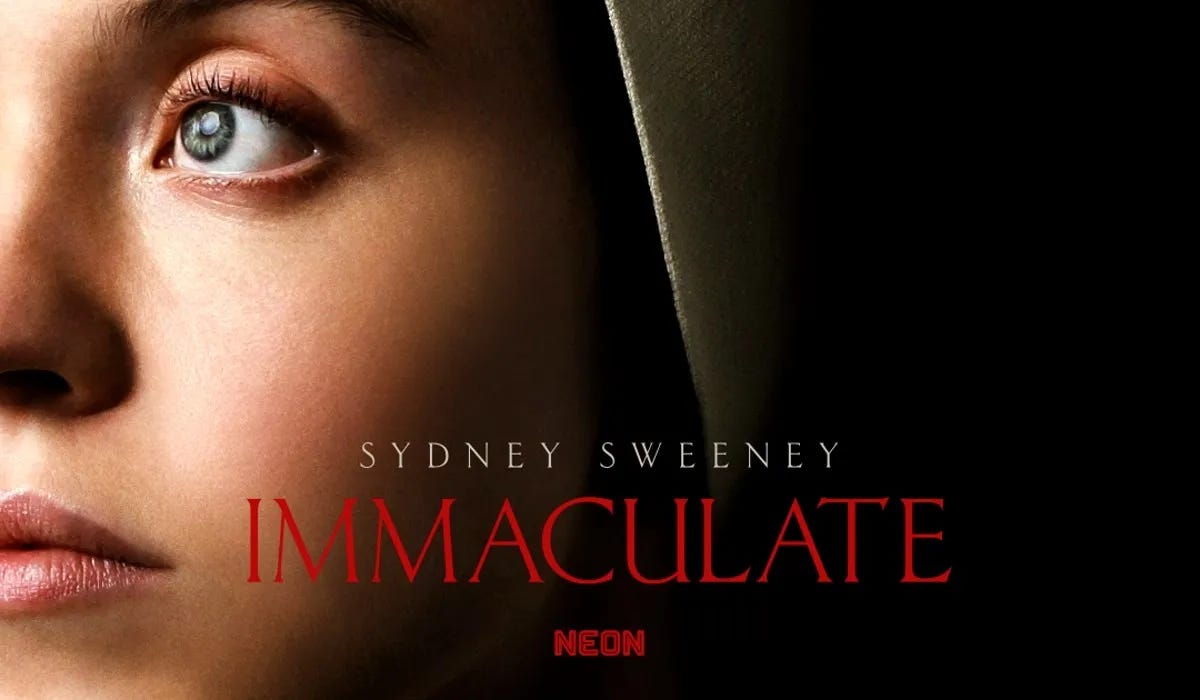Immaculate
"Immaculate" will anger many in the way it's been conceived.
Film Yap is a reader-supported publication. To receive new posts and support my work please consider becoming a free or paid subscriber.
“Immaculate” (now in theaters) is gonna piss a lot of people off. It’s not that the film is anti-religion, but it’s definitely against the perversion of faith and I suspect some folks may get the two twisted.
Current “It girl” Sydney Sweeney (who also produced the picture at the tender age of 26) stars as Sister Cecelia, an American nun from just outside of Detroit who gave her life over to God after surviving a drowning when she was 12.
She’s been summoned to work at an Italian convent that serves as a convalescent home of sorts for nuns who are knocking on Heaven’s door. She was recruited for the position by Father Sal Tedeschi (Álvaro Morte of Netflix’s “Money Heist”) despite not speaking much Italian.
While at the nunnery Cecelia befriends fellow nun Sister Gwen (Benedetta Porcaroli). Not everyone is quite so welcoming: Sister Isabelle (Giulia Heathfield Di Renzi) seems jealous of Cecelia from the jump and Mother Superior (Dora Romano) is a harsh taskmaster with zero time for frivolity.
Shortly into her stay it’s discovered that Cecelia is pregnant. She’s questioned by Cardinal Franco Merola (Giorgio Colangeli) regarding the adherence to her vows. Through investigation it’s discovered that the young American has remained chaste. Cecelia’s pregnancy is deemed a miracle of Immaculate Conception (hence the title). She’s kept under the care of Dr. Gallo (Giampiero Judica) and is being closely watched by convent officials who won’t allow her to leave the grounds.
Sweeney reteams with her “The Voyeurs” director Michael Mohan. Much like Mohan made a throwback to erotic thrillers of the 1990s with that picture; he’s made an homage to nunsploitation films of the 1970s here. It’s a glacially-paced slow burn of a horror-thriller. (I’d argue it’s too much of a slow burn – its mere 89 minutes feels far longer.) It’s handsomely made and is shot by Elisha Christian (reteaming with Mohan after “The Voyeurs”) and edited by Christian Masini (another “The Voyeurs” holdover) in a manner befitting its ‘70s inspirations. The tinny orchestral score of Will Bates (yet another “The Voyeurs” alum) further hammers this stylistic motif home.
Sweeney is the best reason to see “Immaculate.” She sells a sweet innocence in the picture’s early goings only to become progressively more feral and fierce as the film delves into deeper depravity. Her guttural scream that concludes the movie echoed with me well after the closing credits rolled.
“Immaculate” is a provocative work that will likely anger a lot of its audience (religious figures are dispatched via cross bludgeoning, rosary bead strangulation and stabbing with one of the spikes that crucified Jesus Christ), but it also has important things to say about how religious organizations often suppress women’s sense of self by telling them what to do with their bodies and souls. I had a hearty laugh when getting into and turning on my car immediately after the movie R.E.M.’s “Losing My Religion” was playing on the radio. I couldn’t have capped off my screening any more concisely.



